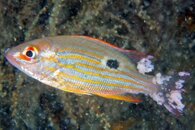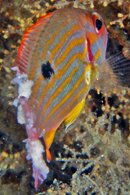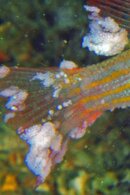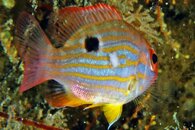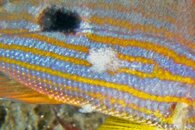You are using an out of date browser. It may not display this or other websites correctly.
You should upgrade or use an alternative browser.
You should upgrade or use an alternative browser.
White Stuff
- Thread starter mntlblok
- Start date
Please register or login
Welcome to ScubaBoard, the world's largest scuba diving community. Registration is not required to read the forums, but we encourage you to join. Joining has its benefits and enables you to participate in the discussions.
Benefits of registering include
- Ability to post and comment on topics and discussions.
- A Free photo gallery to share your dive photos with the world.
- You can make this box go away
designbysue
Contributor
Reminds me of "ich" (think that is the spelling) - a fungal infections I used to see in my aquarium from time to time.
mntlblok
Contributor
Reminds me of "ich" (think that is the spelling) - a fungal infections I used to see in my aquarium from time to time.
Ichthyophthirius multifilis or Ich. Had never heard of it. Apparently a protozoan "infection". Didn't see any pics that looked like this, but it *is* white.
Kevin
designbysue
Contributor
The salt water version is Cryptocaryon irritans but i couldn't find any pics that show it as intense as what your photo shows. Maybe you could post it here Saltwaterfish.com - Saltwater fish forums and reviews It is a site for aquarium fish, but maybe someone would know there.
Scuba Monkey
Registered
I would guess it's a Lymphocystis virus. FA181/FA181: Lymphocystis Disease in Fish
designbysue
Contributor
That looks closer - interesting that the article says it clears up on it's own - I figured these fish were goners.
mntlblok
Contributor
I would guess it's a Lymphocystis virus. FA181/FA181: Lymphocystis Disease in Fish
*Way* more than I wanted to know about *any* fish disease, but it *was* kind of interesting. Noted:
[h=2]"Can lymphocystis be confused with any other diseases?[/h] Yes. In early stages of the disease, the nodules may be relatively small and may be confused with the parasites Ichthyophthirius multifiliis (Ich, freshwater white spot disease), Cryptocaryon irritans (marine white spot disease), digenean trematodes ("grubs"), or heavy infection with Epistylis (a stalked, ciliated, protistan parasite). Lymphocystis nodules may also be confused with epitheliocystis (an intracellular bacterial disease), clumps of fungus, or mucus tags. Some skin neoplasias (cancers) may also be confused with lymphocystis.
Because of the potential confusion with other disease agents, diagnosis of lymphocystis should be accomplished by a qualified fish health professional to rule out these other potential causes."
Kevin
Similar threads
Trip Report
Palau Black Pearl liveaboard
- Replies
- 10
- Views
- 1,614
- Replies
- 6
- Views
- 724
- Replies
- 2
- Views
- 586
- Replies
- 12
- Views
- 1,845




